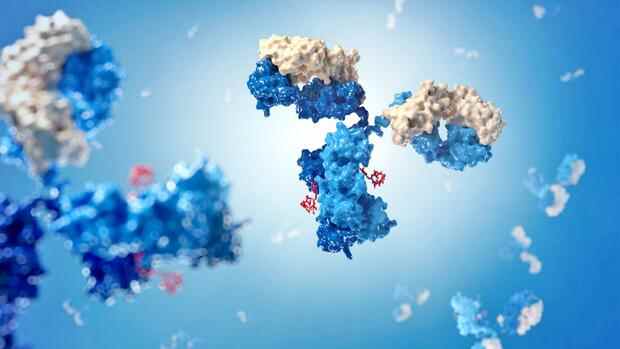Frankfurt The biotech company Heidelberg Pharma is strengthening its financial reserves and research activities through an alliance with the Chinese company Huadong Medicines. The group intends to invest more than 100 million euros in the company and would thus become the second largest shareholder with a future share of around 35 percent, as Heidelberg Pharma announced on Monday.
The main shareholder of the listed company remains the Dievini Hopp Biotech Holding of the SAP founder Dietmar Hopp, previously the main financier of Heidelberg Pharma. The stock exchange reacted on Monday with a price jump of more than 50 percent. The Heidelberg Pharma share was able to make up for the losses of the past few months.
The company, based in Ladenburg near Heidelberg, grants Huadong an exclusive license for the development and commercialization of the two cancer drug candidates HDP-101 and HDP-103 in Asia (excluding Japan) as part of the cooperation, as well as exclusive options on two other portfolio candidates. This will make Huadong a strategic partner for product development in Asia.
The Chinese are paying 17.5 million euros in advance and up to around 400 million euros per product depending on certain development successes. The potential total volume of the deal thus adds up to 825 million euros.
Top jobs of the day
Find the best jobs now and
be notified by email.
In addition, Huadong intends to invest EUR 105 million in Heidelberg Pharma through a capital increase and the purchase of shares from the previous majority shareholder Dievini. The deal is likely to be the largest commitment by a Chinese pharmaceutical company in the German biotech industry to date.
Hopp Society Dievini wants to remain the largest shareholder
Hopp’s investment company Dievini, which has held more than 70 percent of the capital to date, intends to remain the largest shareholder with a future stake of around 46 percent even after Huadong has entered the company.
The planned capital increase is said to have a total volume of EUR 80 million, with Dievini wanting to cede his subscription rights to Huadong. In addition, Dievini wants to sell nine percent of the capital to Huadong.
This corresponds to the desire of the Chinese partner to establish a strategic position at Heidelberg Pharma. “Otherwise we would not have sold any shares,” said Christof Hettich, Managing Partner of Dievini and Chairman of the Supervisory Board of Heidelberg Pharma. We are very satisfied with the development of the company.
The entry of the Chinese company is still subject to approval under foreign trade law. In addition, Huadong makes the deal conditional on being exempted from the obligation to submit an offer by the Bafin.
Company boss Jan Schmidt-Brand rated Huadong as a reliable long-term investor who fully supports the company’s strategy. “Through this partnership, we will be able to accelerate our product development and expand our pipeline,” Schmidt-Brand said Monday.
It is believed that Huadong’s expertise and knowledge of the Asia Pacific region will both shorten time to market and maximize commercial opportunities for its products in the region.
The listed Chinese healthcare company recently achieved sales of around 5.2 billion dollars, 1.7 billion of which came from pharmaceuticals. It is majority owned by the chemical and pharmaceutical conglomerate China Grand Enterprise.
Antibodies are supposed to transport cell toxins
Heidelberg Pharma is working on a series of so-called antibody-drug conjugates (ADCs). These are antibodies to which a cytotoxin is coupled. These should transport the poison as specifically as possible to cancer cells and thereby protect healthy tissue. The concept has recently caused a sensation and is also being intensively pursued by various large pharmaceutical companies such as Astra-Zeneca and Roche. Several drugs based on the technology are already on the market.
The products from Heidelberg Pharma, in which the fungal toxin Amanitin is coupled with an antibody, are still in a relatively early development phase. The first clinical trials for HDP-101 began in mid-February. The active ingredient is being tested in patients with multiple myeloma, a relatively common type of blood cancer. The second product, HDP-102, targets prostate cancer but is still in preclinical testing.
In addition, Heidelberg Pharma is working on other active substances based on its ADC technology against various other types of cancer. These projects are also still in the preclinical research phase. Heidelberg Pharma is planning the first clinical tests for these active ingredients for 2023.
More: Moderna is amassing more than $17 billion in reserves for expansion
